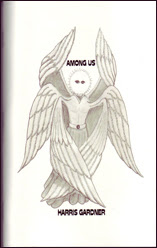
Among Us
by Harris Gardner
Cervena Barva Press, 2007
45 pages, $7
http://www.cervenabarvapress.com
Angels have held a fascination for many writers: Milton, Hass, Hopkins, Billy Collins, to name a few. But how does one manage to address the imperceptible, let alone the holy? Gardner’s answer is to bring angels down to earth, to imbue them with human characteristics and foibles. One of the early poems in the book, “Prequel to Exile” sets up a scene between the archangel Raphael and Adam that illustrates this technique.
Raphael instructs a rapt Adam:
“Set the plants and shrubs in even rows.
Sprinkle gently; grind with rocks what remains
from each meal. Cover the base with this blend;
then add plenty of fragrant earth.
The birds and bees will aid your labor.”
Adam’s response abruptly turns the tone
that stuns the learned seraph.
“Yes, yes, so you have taught before.
What makes me more curious
Is do the angels have sex in Heaven?”
Startled, the winged teacher blushes.
There is playfulness here, both in Adam’s question and in Raphael’s embarrassed response. Or take “Invitation to the Angels’ Ball”:
Please wear your best wings, dress is formal,
although this request is a bit abnormal.
Don’t worry if your halo is a tad out of date.
Wear your best pressed gown, we’ll still let you in.
It will be a rollicking frolic, a real swell time.
Gardner paints an image of angels as nervous girls before a middle school dance, and the idea of angels worrying about whether their haloes are out of fashion is charming. This poem, like many in the book, is not an attempt at religious insight, but rather a re-imagining of the celestial realm. In Gardner’s view, angels may really walk among us. “Can you ever date an angel? I often think so; / however, she turns out human after all. / ...I’ve never met an angel, or have I?” Or, from the title poem: “Perhaps when we look for them, / we can see angels everywhere.”
Gardner’s language ranges from the vernacular – “What, did I put too much spice in the lamb?” or “My high school economics teacher wrote in my yearbook...” – to a less successful vaunted diction that mimics biblical construction. But there are times when Gardner’s rich vocabulary serves him well. Consider the alliteration in the second stanza of “Angel of Faith”:
Elixir-tipped quills fill her quiver.
Tiny wounds heal deeper hurts.
Clarity quickens yearning throngs
who pause their flight from a thousand nicks
and karmic debt-collectors.
“Elixir” zings off of “quiver”, and “quills” flows beautifully into “fill.” There is a real ear at work here.
This collection’s central strength is its admonition to the reader to look beyond the mundane. “Seeing angels may challenge your vision. / No cost to believe in noble winged creatures.” In our bitter post-post-modern age, this is a welcome thought.
Eleanor Goodman/ Ibbetson Update/ Jan 2008



































No comments:
Post a Comment